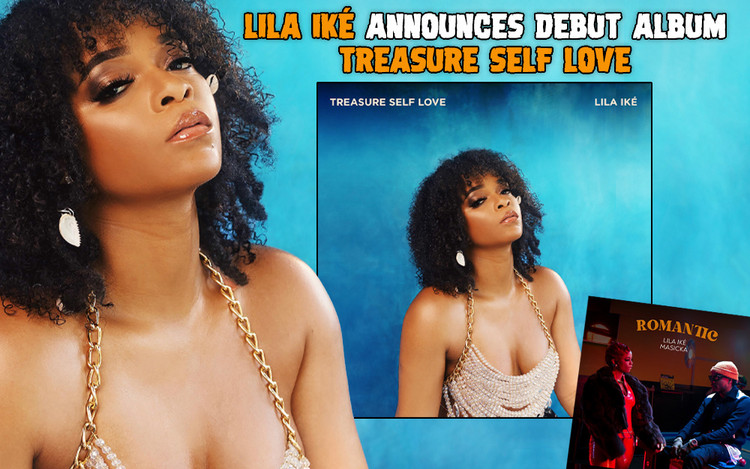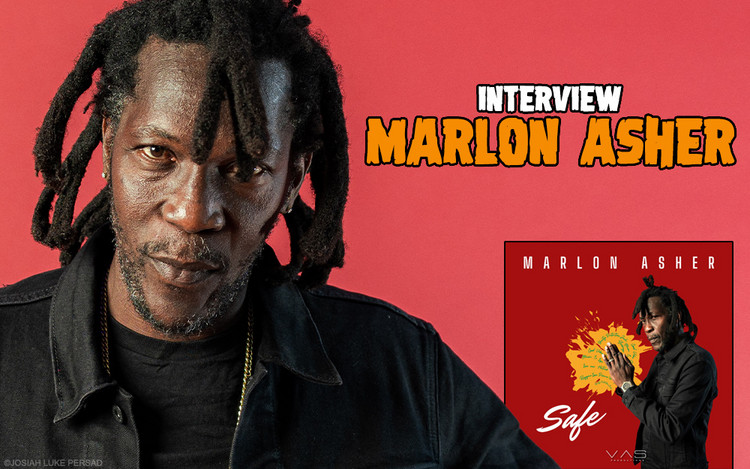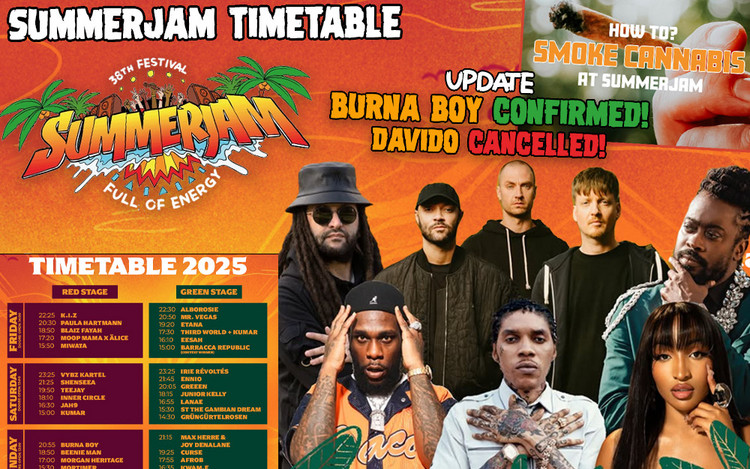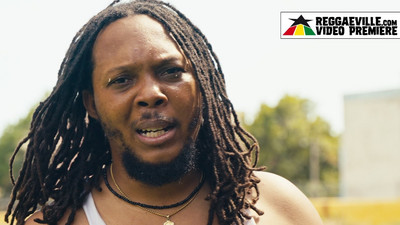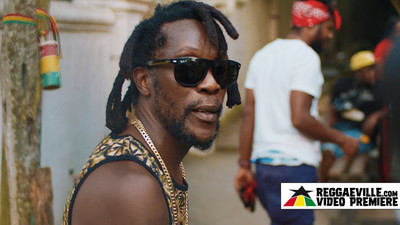Brushy One String ADD
Interview with Man Free Director Kinsey Beck
01/29/2012 by Angus Taylor
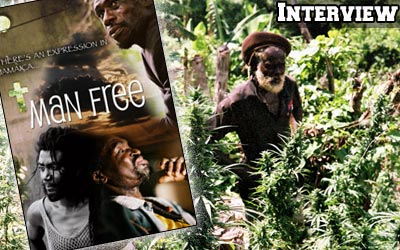
Kinsey Beck is the director of the new documentary Man Free – which has been steadily attracting acclaim at film festivals in Europe, the USA and the Caribbean. Shot in various locations around Jamaica in 2003 and 2004, it’s not a “reggae movie” per se – focussing more on the lives of ordinary people and the trials they face in achieving their goals. The film also features one of the last interviews with The Harder They Come helmer Perry Henzell, who sadly passed away in 2006. Beck’s other documentaries include Circles In The Desert, looking at lives of Israelis and Palestinians, and his latest project Street Apostle examining Los Angeles gang culture. Kinsey sounded like an interesting character so Reggaeville dialled him up in LA to talk about Man Free and his eventful life – which sounds pretty documentary-worthy in itself!
From the films that you've made it seems you like to be on the frontline of things...
That would be very fair to say. My first film was in Israel and Palestine and I showed up with the camera, got myself some really good fixers and crossed lines of combat or lines of territory multiple times per day. I felt like I could get a real vision and see a real portrayal of what was going on out in the field. My style now has developed where I put myself out there, in the hands of fate and try and navigate through situations to try and find what I'm looking for. What's your background in terms of the visual arts?
What's your background in terms of the visual arts?
I dropped out of high school and moved out of home when I was 14. I was emancipated by the courts when I was 16, so I was a legal adult. I was homeless from basically 15 through 18. I always had the desire to get into, originally, news and feature films. I started out in Los Angeles as a runner, a production assistant and worked my way up to an editor, then I was a director of development for a director named Steve Oedekerk who did all the Ace Ventura movies, Nutty Professor, Liar Liar. Then I found myself back in editing. I learned early on that if I'm a good editor I can actually start businesses with the money I make. So I would use the money I'd make as an editor to fund all these projects. I just taught myself everything on the way up.
It sounds like you went through quite a lot at quite a young age. Would you say it’s given you the resolve required to do the kind of films you make now?
That had a big part in shaping who I am. I guess the biggest thing you might notice is that I don't have a fear - of going into a conflict zone, of going into a village where I don't speak the language. In Israel I almost lost my life, going through a gate that was armed in the middle of the night. Whenever those things happen, don't get me wrong, I'm terrified. I've had a gun put in my face no less than six times and every time it's happened you think you're going to die, you're waiting for the pop. When it's over I look back on it and I'm still as nervous but it's exciting. It's fun sneaking across the line. It's fun trying to sneak into Gaza even though I got caught. All my life people would call me weird, until I started making money and then they called me eccentric. The fact now that I'm eccentric gives me that freedom to be myself and explore what I can do. There's ups and downs to it though: I was homeless from 15 to 18 and I made a million dollars the year I turned 30, but the year I turned 33 I was homeless again and I was eating out of the garbage, so it goes up and down.
Why did you decide to make a film about Jamaica?
I was scheduled to go to Iraq in '04. I wanted to do a documentary to see first-hand what we were getting into, what we were doing, if we were doing anything good and, knowing me, I also wanted to try and tell the insurgents side of the story, which I'm glad I didn't in hindsight. Back at the time there were a lot of people being kidnapped and executed. Right up to the week before people I hadn't talked to in years heard about the project and called me begging me not to go. Then the security team I'd arranged in Iraq backed out because they said what I wanted to do was not acceptable and the whole thing fell apart. So I took a trip to Europe, flew to Paris, took a train to England, was talking with a friend, he said "You should go to Cuba and do a film there". So I called my producer David Garonzik, and said "Hey, let's go to Cuba. We've got all this equipment and all this time and some money" and he said "Great, meet me in Jamaica." So I went from England to Paris, Paris to Atlanta, Atlanta to Miami, Miami to Kingston, Kingston to Montego Bay, all within 48 hours. I was in Jamaica six hours and I realised that there's something special about this place, "I want to do a documentary here."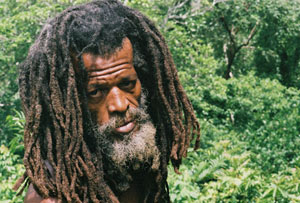 Did you deliberately talk to ordinary people instead of say, reggae artists? Or did the artists just ask for too much money?
Did you deliberately talk to ordinary people instead of say, reggae artists? Or did the artists just ask for too much money?
(laughs) It was never part of what I wanted to discuss. I've seen so many things about reggae my whole life. I grew up in the mod scene listening to ska music, Selector and Madness, I was listening to them before I was a teenager. So from the get go I was focussed 100% on discovering what it was about the Jamaican people and culture that was so special. The reggae music, even today, still doesn't feel like there's something there that I need to explore, that I want to learn about. I make documentaries about stuff that I want to learn about and that I want other people to be exposed to. For me it's all about how can you increase your perspective on a culture or a society or on a topic. The film to me was about the people and about what they possess, which was so special from the moment I was there. They might not have a lot of money but they have humility and they have freedom and there's something about those two things together that makes them a very powerful nation.
How did you get Perry Henzell onboard?
That was all David Garonzik. That was David's role. I would go out in the field and do the work and come back and he would be researching about where I could go the next day. So he told me one day “I got a hold of Perry Henzell! He said he'd do an interview". So we drove across the island and he met us down the road and took us up to his house. I knew of his work, I knew of The Harder They Come, but I had not seen it at the time. Jamaica was still a new thing for me, which is kind of the way it needs to be for me when I do this, so that I ask these questions. David was always surprised that I was asking these questions about people and about the country and wasn't super concerned about his history with Bob Marley or Island Records and whatnot. So it ended up being a really nice combination of what he could bring to the table, but from a different perspective, about the country itself and about the people. We tried to get the film to him but that was right when he was doing publicity for No Place Like Home, which David also produced. He was getting a little more tired more frequently and unfortunately he never got the chance to see it.
It was your editor Alexis Chavez who selected the music, right?
I've done three documentary features where I write, shoot, produce, edit, record sound; I'm out in the field pretty much by myself. But I've learned over the years that I can't write, shoot, direct, produce, record sound and all that, and come home and edit it. I'm too close to the project, to the footage. So David brought in Alexis Chavez, a brilliant editor, he edits for Oliver Stone, and he and David shaped Man Free. So when Alexis cut the film with David, they put in a whole set of music that's not even in the film now. They put in some obscure great music that they loved. Then when I started getting the film ready to clear I realised that the music that we'd put in was way too expensive, so I called up Alexis and he was working on cutting a TV documentary series for Oliver Stone, and he said "Look, the library we're using has some really great tracks. How about I spend a couple of hours and go through and listen to the tracks and give you a list?"
The only track I recognized as non library was a Lutan Fyah track in the scene where the kids are listening in the studio - which is theirs, so good to use?
Even though the music library stuff is actually from real Jamaicans, there's two or three tracks from those kids, and my next film, which I'm releasing right now, I spent six months with the Bloods and the Crips in downtown Los Angeles and Gambling House Records provided all the music for the entire film. There's a couple of tracks that are in both films, so it worked out really well for me in the end and it worked out great for the kids in Jamaica, they're published artists.
One musician who does appear in the film is Brushy One String and I think this must be his third film appearance lately. Had he been filmed before, when you shot him?
My understanding is that I was the first to shoot him, which would have been in '03 or '04. Rise Up was shot, I think, in '06. I have a whole concert of him in a bar in Negril playing music that we're going to put up on our YouTube channel (www.youtube.com/user/manfreemovie). He ended up becoming a good friend. I lost contact since he got involved in Rise Up and his life blew up, and I'm really happy for him. I wasn't surprised at all when he started blowing up. I hung out with him, he had something special. 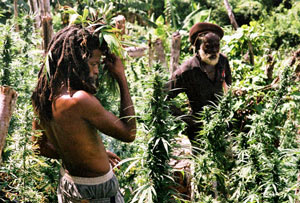 How easy was it to film the ganja plantations? Was it just a case of not filming certain people?
How easy was it to film the ganja plantations? Was it just a case of not filming certain people?
It was easy because Jah B, who I still talk to once a week - he's family, most of the people in the film have become family to me - knows the plantation owner. They trusted me because of Jah B. I gave them $40 for the location fee and interview. But I did have to go through a certain procedure afterwards, to assure the farmers that nothing bad would come of it. One of those things is that that scene can never air in Jamaica. It just so happens that Jamaica won't air it anyways because it's illegal. TVJ wants to air Man Free, and one of the pre-requisites for them is that I have to remove the entire scene.
What about the scene where a baby appears to hit the chalice? Did the baby actually smoke?
No, you really have to draw hard on the chalice, so I've been told. The baby didn't actually draw on it. It has a visceral reaction in everyone who watches it and I'm not trying to diminish what you saw, in my opinion that baby growing up, putting the chalice to its mouth, I have great concerns that that is going to leave certain impressions on that child's future. That scene for me really was showing the other side of the story from the farmer who said that there's really nothing wrong with marijuana. I was just trying to point out that, like any drug, it can be bad. It can have grave consequences from physical health to productivity, and I wanted to try and give both sides of that story.
Out of the characters that you met in the film, who made the biggest impact on you?
Perry has a large impact because Perry's purpose is really to give the audience perspective. Just like Perry talks about how Jamaica's the middle ground between Africa and America, I wanted Perry to be that middle ground between America and Jamaica. Aside from that probably the biggest character would be Danny, the twin artist. The thing he brought to me was the belief that Jamaicans feel that the so-called worst of the slaves were brought to Jamaica, those who refused to bow down to the master's whip, all the princes and prophets and kings, all those people who stood up to the original oppression. These are people who really believe that they stood out. They have this pride but they're very humble, which is something that is missing in the rest of the world these days. If you look at America, to me America's problems all stem from pride. Austerity is a word that will never be spoken in America but every day you talk to Jamaicans and they'll say "Well you know, we lost our house last week, but everything's good. I'm happy in my life, everything's great". There's just a sense there that is amazing and it's why I think Jamaica is the greatest place on earth. It's why I'm trying to move full-time there as of next year. I hope to be here next year and away from this next year.
Your films seem to involve places of struggle. Is that an important theme for you?
Absolutely, to show that these people are dealing with struggles that most of the world doesn't deal with, yet they remain positive, yet they remain happy, yet they are joyful. That's the essence of this film, that's the subtext for me, that's what gives them their freedom, that's what enables them to experience the sense of freedom. They're not chained down by their struggle. They're not defined by their struggle, Jamaicans really are defined by their sense of freedom. They're defined by their acknowledgement of God, Jamaica is a God-fearing country, they're not a religious country like America. So all those things come together and that's the thing I'm trying to show people: "Look, here's this group of people who have nothing. They struggle every day. Every aspect of their life is a struggle but you don't see that when you talk to them. It's not the overwhelming factor in every conversation you have".
Would you ever feel comfortable with someone turning the camera on you and doing a film about your own life?
(laughs) It's funny you say that. It has come up in the last year or so. There's a lot of facets to my life that I tell people and they find it interesting. Yeah, I would. My next project is that I'm going to take my 40-foot commercial fishing boat through the Caribbean, spend two months doing the same thing I did for Jamaica only on the Caribbean. My goal in life right now is to move my company to Jamaica. If, to get to that point, I was put in a position where someone wanted to include me in some type of a thing like you're talking about, then absolutely.
MAN FREE is available as DVD and BLU-RAY @ MANFREEJAMAICA.com
The iTunes release date will be announced soon




